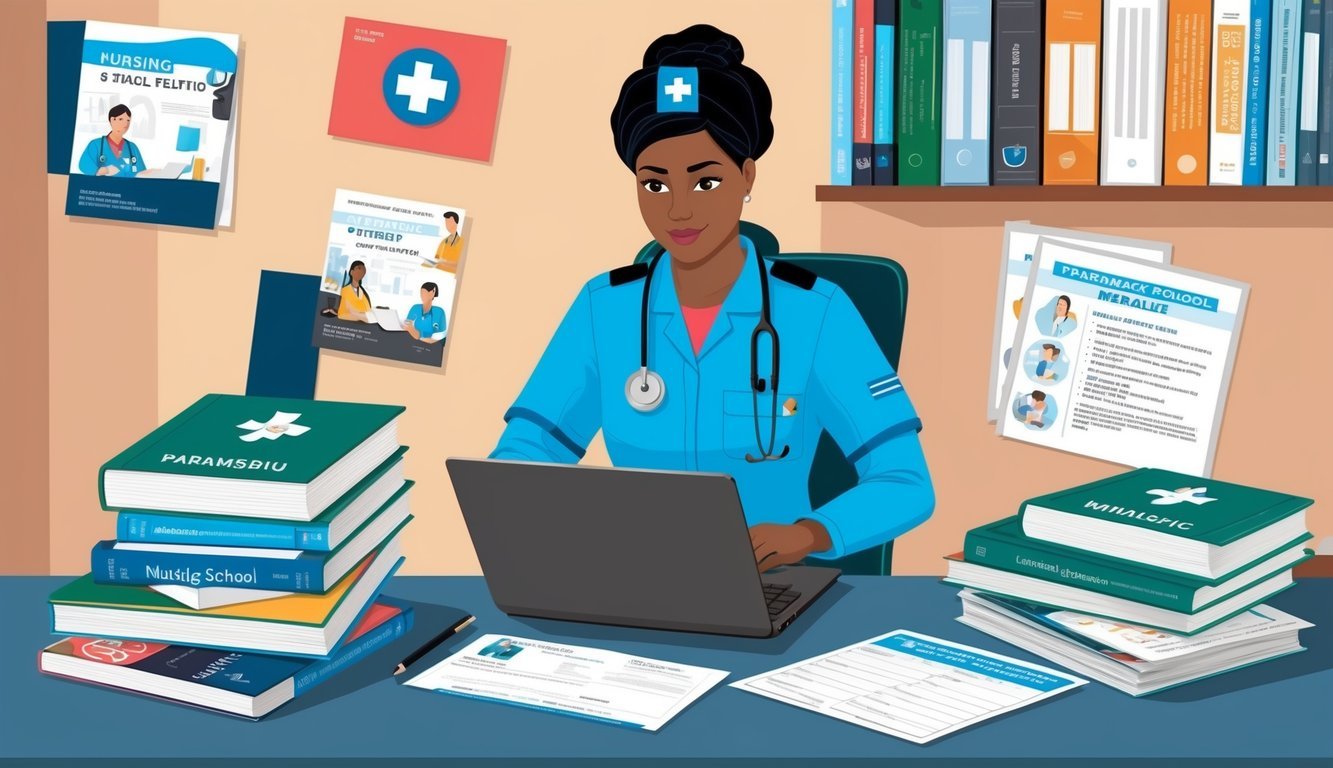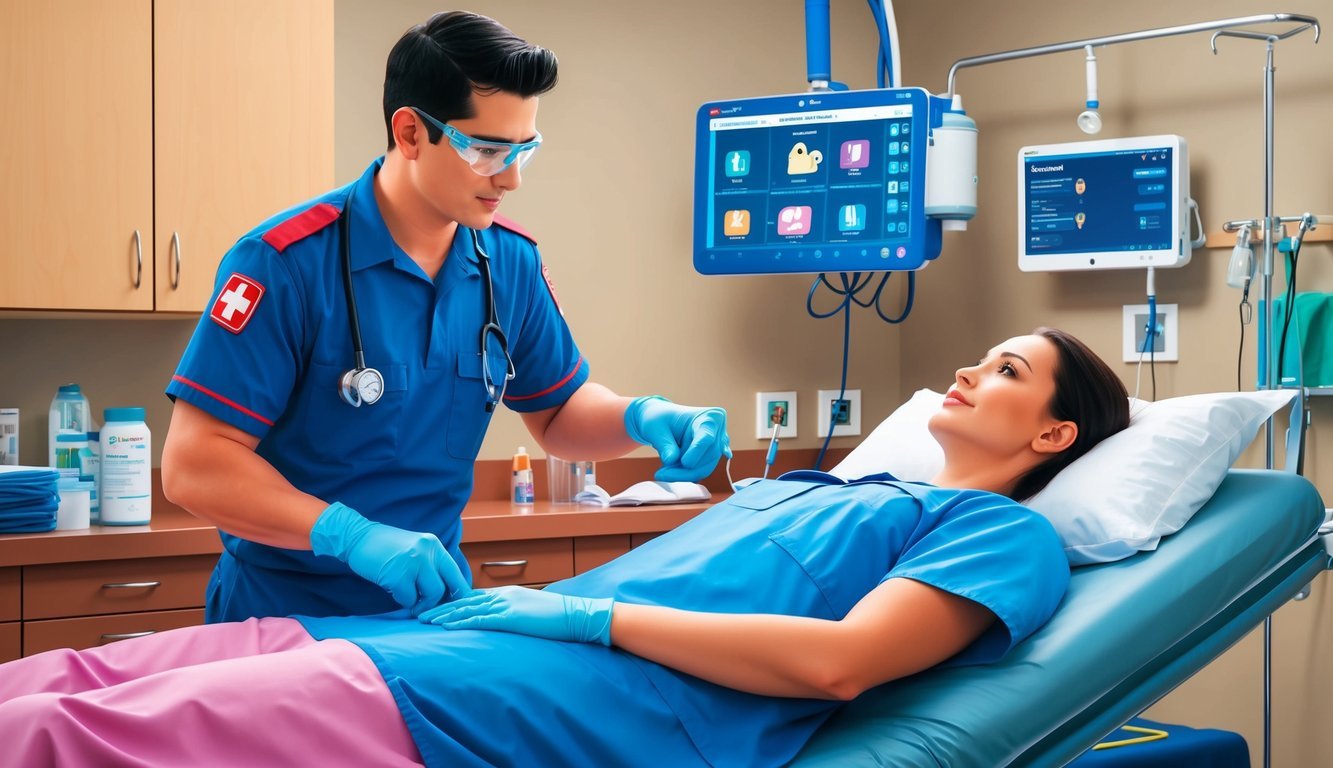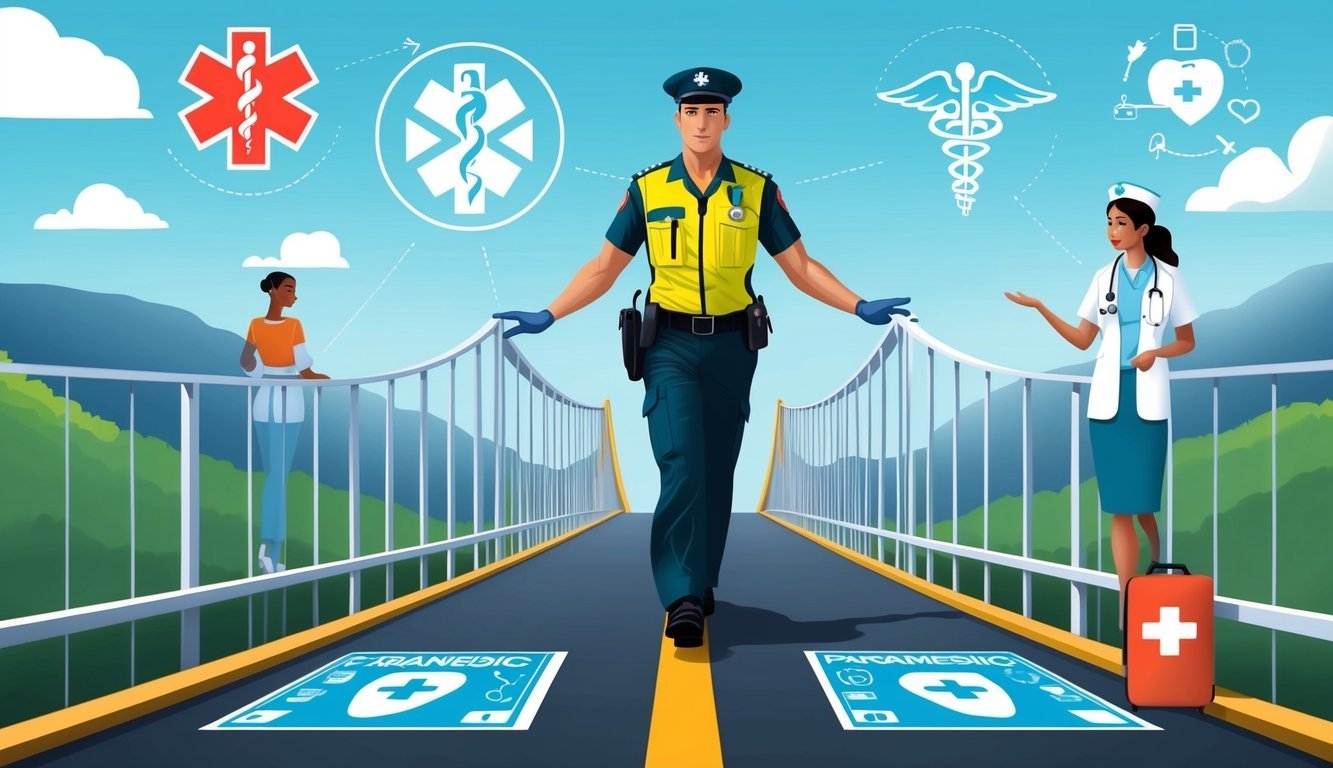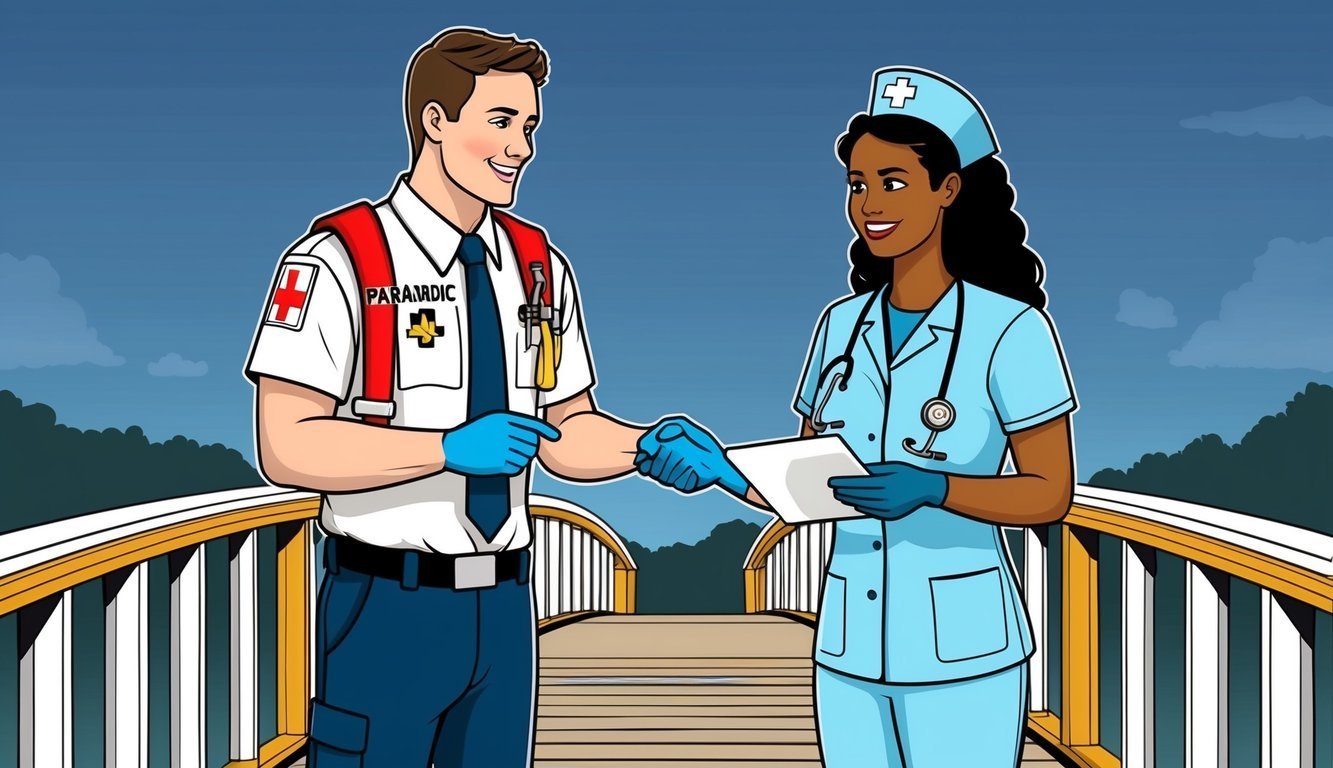Transitioning from a paramedic to a registered nurse (RN) is a smart move for those looking to advance their nursing career.
With your existing medical training and field experience, a paramedic to RN bridge program allows you to build on your skills and expand your knowledge in patient care. These programs provide a pathway for paramedics to become RNs in a relatively short time, typically within 1-2 years.
As you consider this transition, it’s important to explore the various bridge programs available.
Many of these programs are designed to accommodate your busy schedule, often offering online options that fit your lifestyle.
You can find specific details about admission requirements, costs, and curricula by examining resources like Nurse.org or NurseJournal.org.
Embarking on the journey from paramedic to RN not only elevates your professional status but also enhances your ability to provide comprehensive care to patients.
By leveraging your background and enrolling in a bridge program, you position yourself to make a significant impact in the nursing field.
Your skills as a paramedic will be invaluable as you gain further expertise and patient care knowledge in your new role as an RN.
Understanding Paramedic to RN Bridge Programs
Paramedic to RN bridge programs are designed for paramedics seeking to transition into registered nursing by building upon their clinical knowledge and skills.
These programs vary in structure and outcomes, offering both Associate Degree in Nursing (ADN) and Bachelor of Science in Nursing (BSN) options to meet your career goals.
Definition and Purpose of Bridge Programs
Paramedic to RN bridge programs specifically cater to those who are already licensed paramedics.
They aim to provide the necessary education and clinical training to help you step into an RN role.
These programs typically cover:
- Nursing theory: Essential concepts that form the basis of nursing practice.
- Patient care planning: Strategies for delivering efficient and effective patient care.
- Mental health: Training in psychological assessments and interventions.
The ultimate purpose is to enhance your medical expertise and prepare you for the NCLEX exam, which is required for RN licensure.
Types of Bridge Programs: ADN and BSN
Bridge programs offer two primary pathways: ADN and BSN.
Each has its own focus and advantages.
| Program Type | Duration | Outcome | Focus |
|---|---|---|---|
| ADN | 1-2 years | Associate’s Degree | Entry-level nursing practice |
| BSN | 2-4 years | Bachelor’s Degree | Advanced nursing roles |
ADN programs are often quicker, allowing you to start working sooner.
BSN programs provide a broader education and are preferred for some positions in healthcare.
You can find various options, including online paramedic-to-RN programs that offer flexibility to fit your schedule.
Choosing the right program depends on your career aspirations and lifestyle.
Eligibility and Admission Requirements

When considering a paramedic to RN bridge program, understanding the eligibility criteria and admission requirements is crucial.
These guidelines ensure that you meet the necessary qualifications for a smooth transition into the nursing field.
Prerequisites for Enrollment
To enroll in a paramedic to RN bridge program, you typically need to hold a current paramedic license.
This demonstrates your foundational knowledge and experience in emergency medical services.
Most programs also require:
- A high school diploma or GED
- Completion of required nursing prerequisites such as anatomy, physiology, and microbiology
- Some programs may prefer candidates with an associate degree in nursing or similar coursework
Verification of CPR certification and a background check are also common prerequisites.
Ensure you review specific requirements from your selected program to stay compliant.
Application Process Overview
The application process generally begins with submitting an application form along with the required documentation.
Key components of the application may include:
- Proof of your paramedic license
- Academic transcripts showing completion of necessary coursework
- Letters of recommendation from healthcare professionals
You might also need to complete an entrance exam, depending on the program.
After submitting your application, be prepared for an interview, which helps assess your commitment and fit for the nursing profession.
Make sure to check each program’s website for specific deadlines and additional requirements.
For more information, you can visit Nurse.org or RegisteredNursing.org.
Educational Curriculum and Competencies
In bridging the transition from paramedic to RN, the educational curriculum is vital.
It encompasses core nursing courses, advanced medical knowledge, and specialized training that collectively enhance your competencies.
Core Nursing Courses
Core courses form the backbone of your nursing education.
You will study nursing theory, which provides a framework for your practice.
Subjects like anatomy and physiology and pathophysiology equip you with essential knowledge about the human body and disease processes.
You will also engage in health assessment, learning how to perform thorough evaluations of patients. Pharmacology is a crucial component, focusing on medication management and understanding drug interactions.
Compliance with program accreditation standards ensures that your education meets industry requirements, enhancing your employability and professional credibility.
Advanced Medical Knowledge
This area deepens your medical expertise, focusing on complex concepts.
Advanced courses may include microbiology to understand infections and their implications in patient care.
You will gain insights into mental health nursing, discussing psychological assessments and therapeutic interventions.
Pediatric nursing is also important, covering developmental stages and specialized care for younger populations.
Understanding these topics will prepare you for diverse clinical situations, ensuring you can deliver comprehensive care across age groups and needs.
Specialized Training and Electives
Specialized training enables you to explore interests and hone specific skills.
Electives may include advanced topics in patient care or family nursing, which focuses on comprehensive care, considering family dynamics in treatment plans.
Hands-on clinical experiences complement your coursework, allowing you to apply theoretical knowledge in real-world settings.
This practical approach ensures you develop critical thinking and decision-making skills necessary for effective nursing practice.
Through these educational components, you will be significantly prepared to succeed in the nursing field, equipped with the competencies needed for various patient care contexts.
Programs typically take 12-18 months to complete, facilitating a quicker transition into your new career.
Clinical Experience and Skills Development

Transitioning from a paramedic to a registered nurse (RN) involves significant growth in clinical experience and skills development.
Your foundation in emergency medical services provides a unique advantage as you build upon your existing knowledge while gaining new competencies in nursing.
Hands-On Training in Healthcare Settings
In your journey to become an RN, hands-on training is crucial.
You will engage in clinical experiences that immerse you in various healthcare environments, such as hospitals and clinics.
- Clinical Skills: You will develop essential nursing skills, including medication administration, wound care, and IV therapy.
- Patient-Centered Care: Emphasis is placed on understanding patient needs and fostering effective communication.
This training often incorporates evidence-based practice, which allows you to apply the latest research in real-world scenarios.
Additionally, your previous experience as a paramedic equips you to excel in trauma and critical care situations, where rapid decision-making is vital.
For further insights, consider exploring Nursing Clinical Training Programs for more information.
Transition from Paramedic Skills to Nursing Practice
Your paramedic background provides a solid foundation as you transition into nursing practice.
Many skills are directly transferable, enhancing your capability to provide holistic care.
- Assessment: You bring advanced assessment skills to the table, which are critical in nursing.
- Emergency Response: Your training in acute situations as a paramedic enables you to respond effectively to emergencies in clinical settings.
As you adapt these skills, focus on integrating trauma care techniques with nursing protocols.
This allows you to maintain a patient-centered approach, ensuring that patients receive comprehensive care.
Engaging in critical care scenarios enhances your ability to manage complex cases.
To explore more about this skill integration, visit Paramedic to RN Programs.
Program Outcomes and Career Advancement

Pursuing a Paramedic to RN bridge program offers substantial benefits, including preparation for the NCLEX-RN exam and enhanced job opportunities.
Transitioning to an RN role not only increases your earning potential but also provides avenues for continued education and professional growth.
NCLEX-RN Exam Preparation
Your education in a Paramedic to RN bridge program will prioritize thorough preparation for the NCLEX-RN exam.
This licensing test is crucial for obtaining your RN licensure.
The program typically includes comprehensive review courses to ensure you grasp key concepts in nursing practice.
Many programs also utilize simulation labs and practice exams, which can enhance your test-taking strategies.
These resources aim to build your confidence and ensure you are well-equipped to pass the NCLEX-RN on your first attempt.
Job Opportunities and Salary Expectations
As an RN, you will discover a wide range of job opportunities in various healthcare settings.
Your advanced skills compared to paramedics allow for roles in hospitals, clinics, and specialty areas like critical care and pediatrics.
The salary difference is notable.
According to the U.S. Bureau of Labor Statistics, RNs have a median annual salary of $81,220, which is significantly higher than the $49,090 median for paramedics.
The enhanced job stability in nursing and opportunities for advancement into roles such as Nurse Practitioner or clinical educator further strengthen the appeal of this career path.
Continued Education and Professional Growth
RNs who wish to maintain their licensure and advance their careers need to continue their education.
Many hospitals and institutions offer financial aid and tuition reimbursement for further education.
For example, pursuing a Bachelor of Science in Nursing (BSN) or specialized certifications.
These qualifications can lead to leadership roles, advanced practice opportunities, and specialized nursing fields.
This can enhance both job satisfaction and salary potential.
Networking with other healthcare professionals and participating in professional organizations can also open doors to new opportunities and provide valuable resources for continued professional development.

